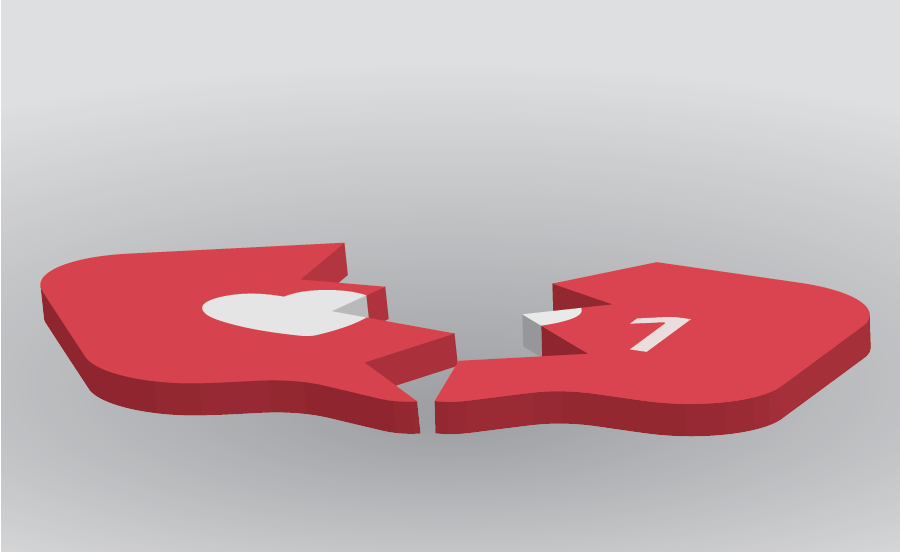Hidden hearts
Her thumb hovers over the Instagram share button. She goes through the photos one last time, zooming into every spot, making sure everything is perfect. She looks at the caption, retypes it, then deletes it and puts in another one. She takes a deep breath, closes her eyes, clicks “share,” and waits anxiously for likes to stream in.
In the past few months, Instagram has been testing out new experiments, such as hiding the number of likes on the posts of their users. This experiment was tested in six countries in July: Ireland, Italy, Japan, Brazil, Australia and New Zealand.
Why hide likes? When Instagram began these experiments, they stated that they wanted others to focus on the actual post, instead of how many likes the post has. This is meant to reduce anxiety that users may have when they post something and immediately worry about how many likes it will get. The idea is that the number of likes on a post is not used as a measure of success, and instead lets the user get a sense of what’s working without worrying about making every post look like a hit.
“I think it would be a good thing,” said Sophie Lewis, a freshman at Greenhills High School. “Honestly, a lot of people just care too much about likes and followers and it kind of consumes you.” She feels that if Instagram hid likes, it would take pressure off of posting on Instagram.
Many people care so much about likes that they delete posts when they don’t get “enough.” When she doesn’t reach her like-goal, she worries that nobody really appreciated the post.
“[I think] ‘Oh, this one didn’t get to 500 likes so I’m going to delete it, because it must be ugly or something,’” Lewis said.
But Lewis is unsure of how this might change if Instagram were to hide the likes on her posts. When asked if she would still delete her posts if the public couldn’t see the number of likes on the post, she responded.
“That’s a hard question. Probably not, because if someone else sees it, they won’t know that it’s not doing well.” For Lewis, this would take some of the stress out of posting. However, when asked if she notices when other people’s posts don’t do well, her answer seemed unexpected.
“No, not really. I kind of just like everything my friends post and I just scroll through my feed.” Despite being so nervous about posting, and worrying about what others think about the number of likes she gets, she admits that she doesn’t care how many likes everyone else’s posts have. When posting on Instagram, it is easy to worry about what others might think if a post does well, but in reality, most people don’t pay attention to stats that are not their own.
All of this seems very stressful, but Lewis says that it is a “form of therapy” for her.
“Whenever I’m feeling kind of bad about myself, I feel like I need reassurance, so I’ll post on Instagram,” Lewis said. “Getting likes and reading all the comments makes me feel better about myself.”
Overall, Lewis thinks it is a good idea for Instagram to hide likes on posts. She thinks it will take a lot of stress out of posting, and still be a way to make you feel good about yourself. However, CHS teacher Robbie Stapleton is skeptical of this new idea.
“I think it’s just a business model designed to make money for the corporation,” Stapleton said. “If they’re saying ‘We’re going to try this because we think it will be better for our user’s mental health,’ then great. I’m not necessarily buying it.”
She thinks that these experiments will give the site publicity.
“This was already a good decision on their part,” Stapleton said. “You and I are talking about it. It’s in the news. Parents are going to hear about it, they’re going to say it sounds great.”
Stapleton admits that she has always been skeptical of businesses whose end goal is to get users addicted to their product. When she heard about what Lewis had to say about how Instagram affects her mental health, she drove this point home.
“That is the inherent conundrum of Instagram or whatever platform you’re interested in,” Stapleton said. “It can make you feel good, but can also make you feel crappy. Either way, it makes you keep using it.”
There are two different perspectives: that of those who see likes as achievements and enjoy the competition, and that of those who see likes as something to stress about.
“There’s an argument to be made that it would increase users’ comfort level because they won’t have to worry about the popularity of their posts,” Stapleton said. “From another perspective, it would decrease users who had Instagram because they liked that aspect of it. I think it’s probably going to be a draw.”
In the end, Stapleton thinks that anything that makes people use their phones more is not necessarily good for their mental health. She thinks that everyone who uses it should be consious of the fact that they are buying into Instagram’s business model and letting themselves become part of their system.
“Instagram is not going away, and we’ll keep using it until the next big platform comes along,” Stapleton said. “If a few people feel less anxious using it now then great. I think that’s awesome.”
When Stapleton heard how Lewis worries what others think when her posts don’t get a certain number of likes, but doesn’t even look at how many likes other people’s posts have, she laughed.
“That’s so classic, the way we think about ourselves,” Stapleton said. “In so many ways, like ‘Oh everybody’s going to think this shirt looks stupid,’ but nobody really cares, and if they do notice, they will say it looks cute.”
Stapleton believes that this idea might be a comfort to some users, but she doesn’t think that this company truly has their users best interest at heart. She is suspicious of these companies and thinks that they are experimenting with this truly for the purpose of gaining publicity and new users.
In the end, although there are a variety of opinions, Lewis and Stapleton seem to agree that this experiment might have some positive impacts on the Instagram community as a whole.
Her thumb hovers over the Instagram share button. She goes through the photos one last time, zooming into every spot, making sure everything is perfect. She looks at the caption, retypes it, then deletes it and puts in another one. She takes a deep breath, closes her eyes, clicks “share,” and waits anxiously for likes to stream in.
In the past few months, Instagram has been testing out new experiments, such as hiding the number of likes on the posts of their users. This experiment was tested in six countries in July: Ireland, Italy, Japan, Brazil, Australia and New Zealand.
Why hide likes? When Instagram began these experiments, they stated that they wanted others to focus on the actual post, instead of how many likes the post has. This is meant to reduce anxiety that users may have when they post something and immediately worry about how many likes it will get. The idea is that the number of likes on a post is not used as a measure of success, and instead lets the user get a sense of what’s working without worrying about making every post look like a hit.
“I think it would be a good thing,” said Sophie Lewis, a freshman at Greenhills High School. “Honestly, a lot of people just care too much about likes and followers and it kind of consumes you.” She feels that if Instagram hid likes, it would take pressure off of posting on Instagram.
Many people care so much about likes that they delete posts when they don’t get “enough.” When she doesn’t reach her like-goal, she worries that nobody really appreciated the post.
“[I think] ‘Oh, this one didn’t get to 500 likes so I’m going to delete it, because it must be ugly or something,’” Lewis said.
But Lewis is unsure of how this might change if Instagram were to hide the likes on her posts. When asked if she would still delete her posts if the public couldn’t see the number of likes on the post, she responded.
“That’s a hard question. Probably not, because if someone else sees it, they won’t know that it’s not doing well.” For Lewis, this would take some of the stress out of posting. However, when asked if she notices when other people’s posts don’t do well, her answer seemed unexpected.
“No, not really. I kind of just like everything my friends post and I just scroll through my feed.” Despite being so nervous about posting, and worrying about what others think about the number of likes she gets, she admits that she doesn’t care how many likes everyone else’s posts have. When posting on Instagram, it is easy to worry about what others might think if a post does well, but in reality, most people don’t pay attention to stats that are not their own.
All of this seems very stressful, but Lewis says that it is a “form of therapy” for her.
“Whenever I’m feeling kind of bad about myself, I feel like I need reassurance, so I’ll post on Instagram,” Lewis said. “Getting likes and reading all the comments makes me feel better about myself.”
Overall, Lewis thinks it is a good idea for Instagram to hide likes on posts. She thinks it will take a lot of stress out of posting, and still be a way to make you feel good about yourself. However, CHS teacher Robbie Stapleton is skeptical of this new idea.
“I think it’s just a business model designed to make money for the corporation,” Stapleton said. “If they’re saying ‘We’re going to try this because we think it will be better for our user’s mental health,’ then great. I’m not necessarily buying it.”
She thinks that these experiments will give the site publicity.
“This was already a good decision on their part,” Stapleton said. “You and I are talking about it. It’s in the news. Parents are going to hear about it, they’re going to say it sounds great.”
Stapleton admits that she has always been skeptical of businesses whose end goal is to get users addicted to their product. When she heard about what Lewis had to say about how Instagram affects her mental health, she drove this point home.
“That is the inherent conundrum of Instagram or whatever platform you’re interested in,” Stapleton said. “It can make you feel good, but can also make you feel crappy. Either way, it makes you keep using it.”
There are two different perspectives: that of those who see likes as achievements and enjoy the competition, and that of those who see likes as something to stress about.
“There’s an argument to be made that it would increase users’ comfort level because they won’t have to worry about the popularity of their posts,” Stapleton said. “From another perspective, it would decrease users who had Instagram because they liked that aspect of it. I think it’s probably going to be a draw.”
In the end, Stapleton thinks that anything that makes people use their phones more is not necessarily good for their mental health. She thinks that everyone who uses it should be conscious of the fact that they are buying into Instagram’s business model and letting themselves become part of their system.
“Instagram is not going away, and we’ll keep using it until the next big platform comes along,” Stapleton said. “If a few people feel less anxious using it now then great. I think that’s awesome.”
When Stapleton heard how Lewis worries what others think when her posts don’t get a certain number of likes, but doesn’t even look at how many likes other people’s posts have, she laughed.
“That’s so classic, the way we think about ourselves,” Stapleton said. “In so many ways, like ‘Oh everybody’s going to think this shirt looks stupid,’ but nobody really cares, and if they do notice, they will say it looks cute.”
Stapleton believes that this idea might be a comfort to some users, but she doesn’t think that this company truly has their users best interest at heart. She is suspicious of these companies and thinks that they are experimenting with this truly for the purpose of gaining publicity and new users.
In the end, although there are a variety of opinions, Lewis and Stapleton seem to agree that this experiment might have some positive impacts on the Instagram community as a whole.









